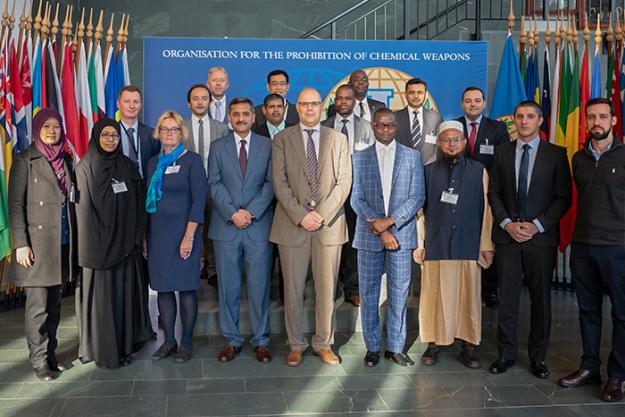
Participants at a workshop on the advancement of the Chemical Weapons Convention (CWC) education
THE HAGUE, Netherlands – 3 October 2018 – Representatives of 14 customs training institutions from around the globe expanded their repertoire of expertise during a two-day workshop on the advancement of the Chemical Weapons Convention (CWC) education. The workshop was held from 26-27 September in The Hague.
The event — organised by the Organisation for the Prohibition of Chemical Weapons (OPCW) in partnership with the World Customs Organisation — allowed training institutions from five geographical regions to exchange experiences related to the introduction of CWC into the national customs curricula.
Director of OPCW’s International Cooperation and Assistance, Mr Hamza Khelif, stated in his opening remarks that customs administrations play an important role in effective enforcement of the transfer regime of scheduled chemicals under the CWC, and therefore in global non-proliferation efforts. “It is important to establish in each country a robust and sustainable system at the national level that will ensure that customs officers have been properly trained in handling cross-border chemical shipments,” he expressed.
During the workshop the participants compiled a list of good practices in the inclusion of CWC-related educational modules for customs officers. The attendees also discussed engagement of various stakeholders in trainings, the use of practical exercises, and the evaluation of training activities. Special emphasis was given to e-learning and digital technologies, including smartphone applications.
The workshop built on the knowledge gained by the participants during the training-of-trainers courses organised by the OPCW since 2016.
The event was attended by representatives from: Antigua and Barbuda, Argentina, Bangladesh, Brazil, Cuba, Estonia, Georgia, India, Italy, Kenya, Malawi, Malaysia, Namibia, and Nigeria.
Background
As the implementing body for the Chemical Weapons Convention, the OPCW oversees the global endeavour to permanently eliminate chemical weapons. Since the Convention’s entry into force in 1997 – with its 193 States Parties – it is the most successful disarmament treaty eliminating an entire class of weapons of mass destruction.
Over 96% of all chemical weapon stockpiles declared by possessor States have been destroyed under OPCW verification. For its extensive efforts in eliminating chemical weapons, the OPCW received the 2013 Nobel Peace Prize.
